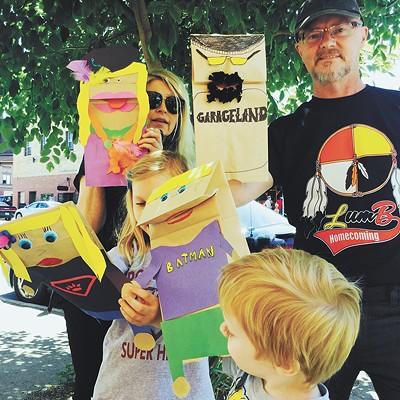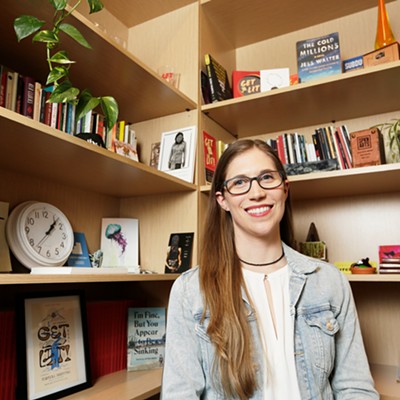Is reading dead? How can I ask? Surely, someone out there is reading these words. Right? In a copy of The Inlander… right? Or maybe on Inlander.com. Probably one or the other, since you can’t get The Inlander on a Kindle yet. But I guess you could be reading this on your phone. Or maybe on an iPad. Then again, your computer, whatever form it may take, just might be reading this column to you, there’s that possibility. Your computer could even be translating this into, say, French, for you. A sort of French. Or even into Braille, if you hook up one of those refreshable Braille displays.
So there’s some kind of reading going on, anyway.
Some say it’s just the book, the paper book, that’s dead, or at least on its way out. (They’ve been saying this for quite some time, actually). Along with the paper Inlander? Because these things, these paper things, have been rechristened by the digerati as “bundles of dead-tree-flakes” and sniffily consigned to the dung heap along with beaver hats and buggy whips.
There are actually two inter-braided waves of projected change being contemplated here, though. The first is the tsunami of the glitzy, clickety, hyper-hopping, social-mediated life that will inundate everything in its path until at last the silicon networks have permanently melded themselves with our vitreous humors.
Well, that one will play out as it will, no doubt. The other question is whether books will continue to exist in the foreseeable future as discrete objects, as private paper pleasures.
I don’t remember learning to read, but eventually it came to this: I found myself walking through the hushed, shadowy, adult section of the Butte Public Library — I’d plowed through the children’s section in about a month — and I spotted a book ahead with an intriguing title: The Martian Chronicles, which, incidentally, I probably read as The Martini Chronicles. See, I’d heard the freefloating word “martini” without being able to couple it with any referent, and then I saw the word Martian, and since my knack for reading had ranged far ahead of my grasp of phonics, not to mention my understanding of the blooming, buzzing world, I assumed that people from Mars were called Martinis. By a similar token I called people from the planet Venus Venetians — or I would have, if I’d ever had the opportunity — though what people from Venus had to do with those horizontally slatted things in our living room windows I had no idea.But I remember how the sepia and newspaper light of the library seemed to change as I opened the book and read: They had a house of crystal pillars on the planet Mars by the edge of an empty sea, and every morning you could see Mrs. Keating the golden fruits that grew from the crystal walls, or cleaning the house with handfuls of magnetic dust….
And I was gone, I tell you. That was it, for me. And that was several thousand books ago, not to mention a cavalcade of other printed matter, newspapers, magazines, encyclopedias, dictionaries, cereal boxes.
And, sure, increasingly, screens and blogs and texts. I do compute. And I’m not saying I didn’t grow up indulging in television. I mean, I still know the Huckleberry Hound theme song by heart. I’ve even played videogames, though my ability stalled out at Pac-Man level. (I was pretty good at Pac-Man, however.)
But reading has always been my thing, resisting all the forces arrayed against it, from “Get your nose the hell out of that book and eat your dinner!” to speed reading. Speed reading…. Why on earth would I want to whip through my pleasure as quickly as possible? Might as well try speed savoring, or rapid-fire relaxation. Even today, why would you want to take your own sweet time just as fast as you can?
But despite cars, we still have horses. And radios, although we have television. And we’ll have our books, even paper ones (we may even keep a paper Inlander). Once I took a copy of Housekeeping, the great Northwestern novel, to a reading by the author, Marilynne Robinson. Robinson praised my coffee-ringed copy extravagantly, the pages so well-thumbed as to be slightly eroded, and then she signed it, and there’s no way ink can bleed into an e-book the way her signature sank into the fibers of Housekeeping.
Then there’s my Braille fantasy. Aldous Huxley — who had problems with his vision all his life — once said Braille had the advantage of allowing him to read in bed with his hands under the covers on a cold night. Plus, he could give his eyes much-needed rest in the dark and still be reading.
I admire this story because I’ve always wanted to read myself to sleep. I’ve tried, but if the material is too interesting, I’ll stay awake until my eyes burn, and that keeps me awake, and if it’s too dull, I get irritated, and that keeps me awake. And I can’t sleep with the light on anyway. But if I learned Braille, I could turn out the light and take up a book, a book off the grid, unplugged, wireless, linkless, uncrashable. I could brush and stroke the pages and read, read, read, until the dots of Braille stung like sparks in the dark, until at last I read myself into a dream, stars tangling in my fingerprints….





















